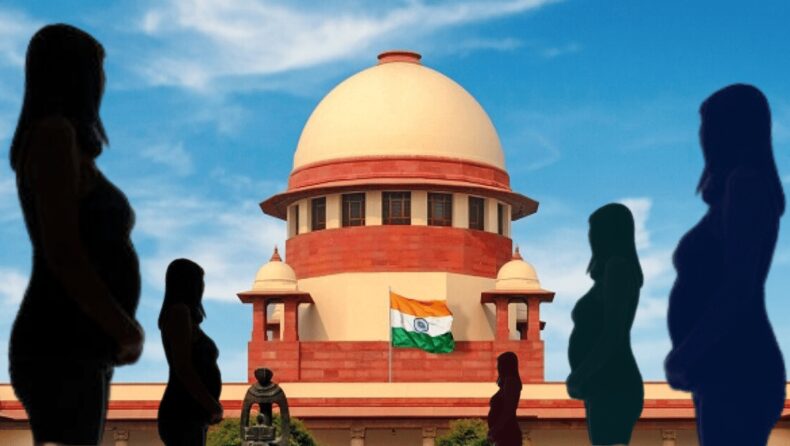Yet another law on a women’s rights but this time for the good?

I think Indians should be relieved to have resided in India rather than any other country in the world now for the most obvious reasons.
Seems like all the ‘developed’ countries have never really developed cerebrally and socially. But India clearly understood the assignment as they say!
This is a slap on the face of misogyny and India is winning even though the fight for equality still has to go a long way within the sub-continent.
Abortion was illegal in India until 1960s with the government criminalizing it under Section 312 of the Indian Penal code (IPC),1860. Under this, both seeking and delivering abortion facilities was both a punishable offence giving up to 3-7 years of imprisonment if found guilty given that there was some relaxation which was negligible.
In 1966, the then minister of public health, law and judiciary, Dr. Shantilal Shah and the committee set up under his supervision recommended that the abortion laws were very restrictive and was in dire need to be redone.
Following this a medical termination bill was passed in both Lok Sabha and Rajya Sabha in 1971. It was then the Medical Termination of Pregnancy Act 1971 was implemented by the next year.
The Medical Termination of Pregnancy Act 1971:
The MTP Act was commenced in 1971 and was functional in entire India except for the states of Jammu and Kashmir.
This act decriminalized the provision of Abortion facilities as well as undergoing medical termination for specific category of pregnancies.
- If the pregnancy is 12 week or less, the abortion can be carrying out by a single doctor’s opinion given that the medical practitioner is a registered one as defined under Section 102 of the Medical Council Act, 1956.
- In case the pregnancy exceeds 12 weeks to 20 weeks after conception, opinion from two certified medical practitioner is required to determine whether or not it is safe to go ahead with the termination procedure.
- The eligibility criterion involved situations where there was a risk to the life of the pregnant woman or in cases where the going ahead with the pregnancy could turn up to be injurious to her physical or psychological health.
- The category of pregnancy included women who is a victim to rape, women who have conceived due to failure of any device or method used by any married woman or her husband for the purpose of limiting the number of children. Medical termination could be performed for a woman under 18 years of age and a medically proven ‘lunatic’ with the consent in writing of her guardian.
This Act was controversial and infamous for its underlying political interest. It is said that this act was made as a tool for population control rather than on socio-economic, psychological and humanitarian grounds for Women in the country.
These were the only conditions under which an Indian woman could enjoy abortion rights, which is honestly not very inclusive.
However, the act was amended in 2021.
Amendment of the MTP Act in 2021:
In September 2021, the MTP Act, 1971, was amended given that there was advance technology available which could carry out termination of pregnancies more than 20 weeks old. So, there was no point limits of 20 weeks.
- The newly formulated act included legalization of medical termination for pregnancies aged more than 20 weeks up till 24 weeks.
- The need for opinions from two doctors for carrying out abortion in pregnancies above 12 weeks to 20 weeks was abolished. Termination could be carried out only with opinion from one doctor till 20 weeks of pregnancy after conception.
- Pregnancies which were aged between 20 weeks to 24 weeks needed opinions from two medical practitioners.
What brought further change to the Act?
The Petitioner is a 25-year-old unmarried woman who is 24 weeks pregnant. She moved to the Supreme Court after she was denied the right to abortion under the MTA Act given that she was unmarried as the amended MTA Act included medical termination over 20 to 24 weeks only in case of conception by a married woman, if not a lunatic, below the age of 18 or a rape victim, due to the presence of ‘Husband’ in the Act.
For the petitioner, it was an unintentional conception with her partner with whom she has currently separated. She stipulated abortion due to incapability to finance the upbringing of a child all by herself and the fact that she wasn’t ready to undergo the physical and emotional aspect of raising a child.
The Supreme Court on Thursday ruled out any limitation of the Act involving unmarried women. It said that excluding single women in consensual relationships would be “unconstitutional”.
It concluded that marital status of a woman shouldn’t stop her from enjoying abortion rights.
The mass view on the Supreme court’s verdict on the Abortion law is positive. Indian crowd has given satisfactory reflex in accordance with the verdic,t calling it progressive and humanitarian.













